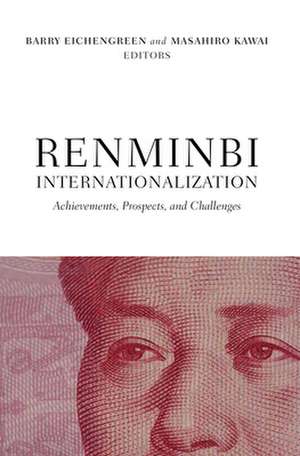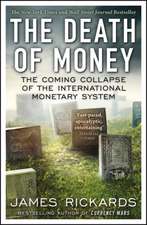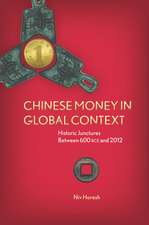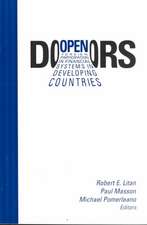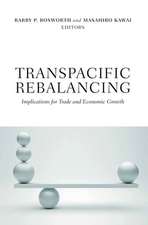Renminbi Internationalization: Achievements, Prospects, and Challenges
Editat de Barry Eichengreen, Masahiro Kawaien Limba Engleză Paperback – 11 feb 2015
Meet the next global currency: the Chinese renminbi, or the "redback." Following the global financial crisis of 2008, China's major monetary policy objective is the internationalization of the renminbi, that is, to create an inter-national role for its currency akin to the international role currently played by the U.S. dollar.
Renminbi internationalization is a hot topic, for good reason. It is, essentially, a window onto the Chinese government's aspirations and the larger process of economic and financial transformation. Making the renminbi a global currency requires rebalancing the Chinese economy, developing the country's financial markets and opening them to the rest of the world, and moving to a more flexible exchange rate. In other words, the internationalization of the renminbi is a monetary and financial issue with much broader supra-monetary and financial implications. This book offers a new perspective on the larger issues of economic, financial, and institutional change in what will eventually be the world's largest economy.
Renminbi internationalization is a hot topic, for good reason. It is, essentially, a window onto the Chinese government's aspirations and the larger process of economic and financial transformation. Making the renminbi a global currency requires rebalancing the Chinese economy, developing the country's financial markets and opening them to the rest of the world, and moving to a more flexible exchange rate. In other words, the internationalization of the renminbi is a monetary and financial issue with much broader supra-monetary and financial implications. This book offers a new perspective on the larger issues of economic, financial, and institutional change in what will eventually be the world's largest economy.
Preț: 388.11 lei
Nou
Puncte Express: 582
Preț estimativ în valută:
74.27€ • 80.99$ • 62.62£
74.27€ • 80.99$ • 62.62£
Carte tipărită la comandă
Livrare economică 24 aprilie-08 mai
Preluare comenzi: 021 569.72.76
Specificații
ISBN-13: 9780815726111
ISBN-10: 0815726112
Pagini: 388
Ilustrații: illustrations
Dimensiuni: 152 x 229 x 34 mm
Greutate: 0.68 kg
Editura: Brookings Institution Press
Colecția Brookings Institution Press
ISBN-10: 0815726112
Pagini: 388
Ilustrații: illustrations
Dimensiuni: 152 x 229 x 34 mm
Greutate: 0.68 kg
Editura: Brookings Institution Press
Colecția Brookings Institution Press
Notă biografică
Barry Eichengreen is George C. Pardee and Helen N. Pardee Professor of Economics and Political Science at the University of California, Berkeley. His books include Hall of Mirrors: The Great Depression, the Great Recession, and the Uses—and Misuses—of History (Oxford, 2013).
Masahiro Kawai is project professor at the Graduate School of Public Policy, University of Tokyo. He was dean of the Asian Development Bank Institute from 2007 to 2014. Before this, he was special adviser to the ADB president in charge of regional economic cooperation and integration and professor of economics at the University of Tokyo's Institute of Social Science. Kawai served as chief economist for the World Bank's East Asia and the Pacific Region from 1998 to 2001, and as deputy vice minister of finance for international affairs of Japan's Ministry of Finance from 2001 to 2003.
Masahiro Kawai is project professor at the Graduate School of Public Policy, University of Tokyo. He was dean of the Asian Development Bank Institute from 2007 to 2014. Before this, he was special adviser to the ADB president in charge of regional economic cooperation and integration and professor of economics at the University of Tokyo's Institute of Social Science. Kawai served as chief economist for the World Bank's East Asia and the Pacific Region from 1998 to 2001, and as deputy vice minister of finance for international affairs of Japan's Ministry of Finance from 2001 to 2003.
Descriere
A Brookings Institution Press and Asian Development Bank Institute publication
Meet the next global currency: the Chinese renminbi, or the "redback." Following the global financial crisis of 2008, China's major monetary policy objective is the internationalization of the renminbi, that is, to create an inter-national role for its currency akin to the international role currently played by the U.S. dollar.
Renminbi internationalization is a hot topic, for good reason. It is, essentially, a window onto the Chinese government's aspirations and the larger process of economic and financial transformation. Making the renminbi a global currency requires rebalancing the Chinese economy, developing the country's financial markets and opening them to the rest of the world, and moving to a more flexible exchange rate. In other words, the internationalization of the renminbi is a monetary and financial issue with much broader supra-monetary and financial implications. This book offers a new perspective on the larger issues of economic, financial, and institutional change in what will eventually be the world's largest economy.
Meet the next global currency: the Chinese renminbi, or the "redback." Following the global financial crisis of 2008, China's major monetary policy objective is the internationalization of the renminbi, that is, to create an inter-national role for its currency akin to the international role currently played by the U.S. dollar.
Renminbi internationalization is a hot topic, for good reason. It is, essentially, a window onto the Chinese government's aspirations and the larger process of economic and financial transformation. Making the renminbi a global currency requires rebalancing the Chinese economy, developing the country's financial markets and opening them to the rest of the world, and moving to a more flexible exchange rate. In other words, the internationalization of the renminbi is a monetary and financial issue with much broader supra-monetary and financial implications. This book offers a new perspective on the larger issues of economic, financial, and institutional change in what will eventually be the world's largest economy.
